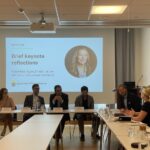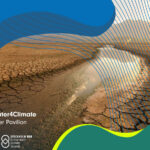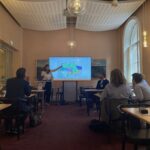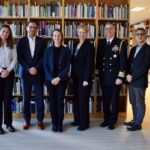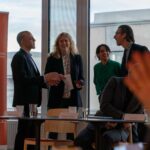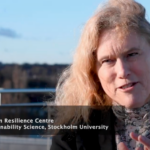On 2–3 June, the global environmental community gathered for Stockholm +50. Hosted by Sweden and Kenya, the meeting combined sessions, dialogues, side events, and webinars on the theme ‘A healthy planet for the prosperity of all – our responsibility, our opportunity’.
Over the two days, the Stockholm Hub on Environment, Climate and Security partner organizations contributed with report launches, sessions and side events, solidifying their function as a “resource for the global community to navigate a complex landscape and make sounder decisions for a safer and more sustainable future”, as laid out by Swedish Minister of Foreign Affairs Ann Linde and Minster for International Development Cooperation Matilda Ernkrans in an article following the meeting. Continue reading to explore a selection of highlights of the Hub partners’ contributions to the work towards a sustainable and just future for all.
Stockholm Resilience Center
In addition to various engagements with the City of Stockholm and other partners during the Stockholm +50 meeting, the SRC and the Beijer Institute of Ecological Economics launched the report “Economy and Finance for a Just Future on a Thriving Planet”. The report presents insights on how economies and the financial sector can contribute to creating a more sustainable and just future. It highlights the role of investors who play a significant role in stabilising crucial tipping elements such as the Amazon rainforest. It also calls on governments and financial institutions to more forcefully phaseout subsidies.
Stockholm International Water Institute
For SIWI, as part of the water community, it was important to be at conferences such as this, to stress that it is essential to not only include but strongly focus on water, as in the global environment work. Water ties all the global sustainability goals together, and by focusing on water we will get access to concrete solutions to many of the challenges we face. The main message of the SIWI representatives is that water can be a powerful tool for positive change and that this is urgently needed. The United Nations Secretary-General has warned that the environmental and security crises are closely interlinked and that the war in Ukraine does not only lead to unspeakable suffering in that country but can also push one-fifth of humanity into poverty. The climate crisis is further undermining global food systems, causing hunger and despair. To reverse the trends of growing crises and inequality, we need to invest in the long-term resilience of both humans and ecosystems.
On the side of Stockholm +50, SIWI met with H.E. Dr. Jasim Abdulazeez Hammadi, Iraq’s Minister of Environment to exchange notes on further strengthening the water and climate segment in Iraq. SIWI’s Swedish Water House held three Stockholm+50 associated events. The webinar series focused on water’s role in achieving a healthy planet for the prosperity of all. Each webinar focused on a specific aspect of water and its role in achieving security, resilient landscapes, and global health.
Watch | The role of water in achieving security | Watch | The role of water in ensuring mosaic landscapes | Watch | The role of water, sanitation and hygiene in safeguarding global health | Read our summary of the key takeaways
Stockholm Environment Institute
SEI and the Council on Energy, Environment and Water presented the scientific report ‘Stockholm+50: Unlocking a Better Future’, which was based on 18 background papers and accompanied by a youth report. It found that since Stockholm 1972, only roughly one-tenth of global environmental targets have been met and proposed three shifts and 52 recommendations.
SEI also collaborated with the World Business Council on Sustainable Development (WBCSD) on a new Action Agenda for sustainable value chains, which proposed three key measures: a global corporate accountability and transparency mechanism, a global circularity protocol, and a global sustainability skills for action initiative.
In addition, SEI organized a summit of the Leadership Group for Industry Transition, contributed to sessions in the One Planet Network Forum on sustainable consumption and production, contributed to the launch of the new Action Plan for Sustainability in a Digital Age, hosted a session on transformative transparency and open data platforms, and co-hosted the academic conference ‘Sustainable planet, sustainable health – how science-based solutions can drive transformative change’ together with Stockholm University, Karolinska Institute and the Royal Institute of Technology. An open letter from science based on the 1972 Menton Message and co-convened by ISC, Future Earth and SEI was launched at the conference.
Stockholm International Peace Research Institute
Against the backdrop of the Environment of Peace: Security in a New Era of Risk report launch, SIPRI gathered a panel at Stockholm+50 to reflect on the key security challenges of transition to a lower-carbon, greener economy. The discussants were comprised of government representatives and climate practitioners, covering a range of issues highlighting the opportunities and challenges associated with mitigation, adaptation and conservation policies and programs. From international cooperation to decarbonization and just transitions, from sourcing critical minerals to environmental peacebuilding, the panel explored steps to support an environment of peace.
Three key transformative actions were identified by the panel; addressing the need for compensation for loss and damage caused by environmental and climate changes in the most vulnerable regions and communities; recognizing the importance for national and local governments to deliberately include all citizens and stakeholders in a meaningful way and to ensure local level access to adequate climate and environmental finance, and; calling for strengthened cooperation across regions and communities in addressing shared environmental challenges.

